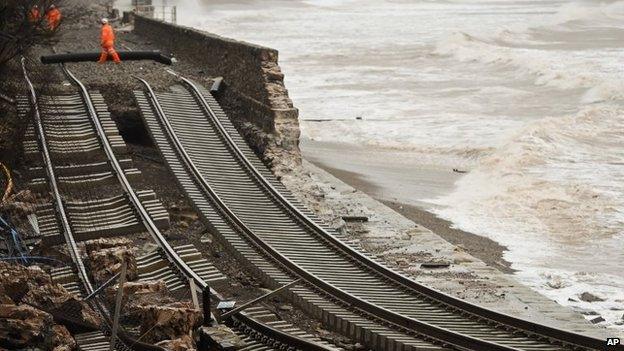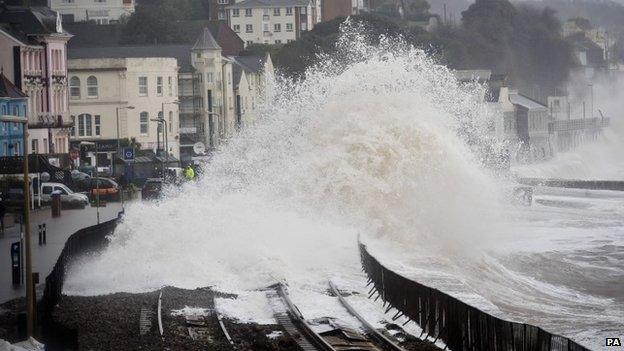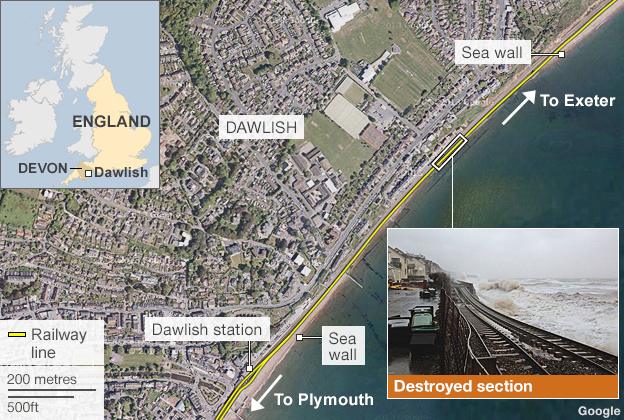UK storms destroy railway line and leave thousands without power
- Published
The railway line in Dawlish is hanging in mid-air, as Jon Kay reports
Parts of Britain have been hit by a storm which destroyed a stretch of railway, forced people from their homes and left thousands without power.
A section of the sea wall in Dawlish, Devon, collapsed and left the railway to Cornwall suspended in mid-air.
Residents of homes on the Somerset Levels were evacuated amid fears flood defences could be overwhelmed.
David Cameron chaired his first Cobra meeting this year and announced an extra £100m for flood works.
At Prime Minister's Questions he pledged £75m for repairs over the next year, £10m for urgent work in Somerset - where several rivers have flooded - and £15m for maintenance.
Mr Cameron said he would "ensure that everything that can be done to get stricken communities moving is being done: there are no restrictions on help".
The BBC's political editor Nick Robinson said Mr Cameron had given the "clearest possible sign" that he needed to "be seen to be getting a grip" on the response to the floods.
Environment Secretary Owen Paterson's handling of the crisis has been widely criticised.
He will not be chairing the Cobra emergency committee or giving a statement to the House of Commons on Thursday after being diagnosed with a detached retina. Instead, Mr Paterson will undergo emergency surgery.
BBC weather presenter Matt Taylor predicts more rain and strong winds throughout February
Western Power Distribution said, external about 44,000 customers had been affected by power cuts since Tuesday afternoon.
By 22:00 GMT on Wednesday, thousands of homes had been reconnected but 953 customers remained without power across the South West. In Cornwall, 490 were still cut off.
On the Somerset Levels, police used a helicopter to advise the occupants of more than 150 properties in Fordgate and Northmoor to leave their homes.
Forecasters say there will be an "improving picture" on Wednesday evening. But there will be rain moving up from the south coast on Thursday morning which will spread to south-west England in late morning. About 20-30mm of rain is expected throughout the day.
More heavy rain and gales are forecast for Friday night into Saturday.
Dawlish resident Robert Parker said the storm was "like the end of the world".
He said: "It was like an earthquake. I've never experienced anything like it. I've been in some terrible storms in the North Sea, but last night was just a force of nature."

A section of rail track dangles over the sea after the wall collapsed at Dawlish

Waves continued to lash the seafront

First Great Western said, external all lines between Exeter St Davids and Plymouth were closed because of the collapsed track at Dawlish and the bad weather.
Limited services are running between Plymouth and Penzance, with rail replacement services due to be provided from Thursday.
Network Rail has estimated the damage at Dawlish could take at least six weeks to fix. First Great Western said the repairs could not begin until the weather improved.
Speaking after the Cobra meeting, the prime minister said he was "determined to ensure a proper alternative service" was provided while the railway line at Dawlish remained out of use, with a solution found to fix it as soon as possible.
The Environment Agency has two severe flood warnings in place, external in south-west England - meaning there is a danger to life - down from a high of nine earlier on Wednesday.
It has also issued about 60 flood warnings and more than 200 flood alerts.
The Scottish Environment Protection Agency has issued five flood warnings, external and several flood alerts.
The Met Office has issued an amber severe weather warning, external for rain - meaning "be prepared"- from 15:00 GMT on Thursday until 23:00 GMT on Saturday across southern England.
"This is the police helicopter, the flood danger is imminent, evacuate"
In other developments:
Twenty people were evacuated from Kingsand in Cornwall because their homes were being damaged by stones washed ashore and coming through their windows
Devon and Cornwall Police received 300 emergency calls overnight. About 100 trees were reported blown over
In Brighton, a significant section of the West Pier skeleton collapsed in high winds and stormy seas
Homes were evacuated on the seafront in Torcross, Devon, after waves smashed the front of four buildings
Portsmouth Historic Dockyard was closed because high winds were causing roof tiles to blow around
Southern said trains were suspended between, external Bexhill and Hastings after high tides and winds caused flooding at Bexhill
South West Trains said a speed restriction of 50mph would be imposed, external on some routes between 10:00 and 19:00 GMT on Wednesday
Winds of up to 92mph (148km/h) were reported in the Isles of Scilly
Labour MP for Exeter, Ben Bradshaw, said damage to the railway infrastructure could "absolutely devastate" the economies of Devon and Cornwall
Coastal areas of Devon suffered severe damage
Looe quay, in Cornwall, is awash with sea water
In Wales, a number of main roads were closed by fallen trees or flooding
Firefighters have also been called out to deal with dangerous structures. There have been two incidents in the Tenby area of Pembrokeshire with roofing being blown off buildings.
.gif)